★★★½
“This cheap Mexi-trash is fun to view, though if you don’t speak Spanish, may lose some depth.”
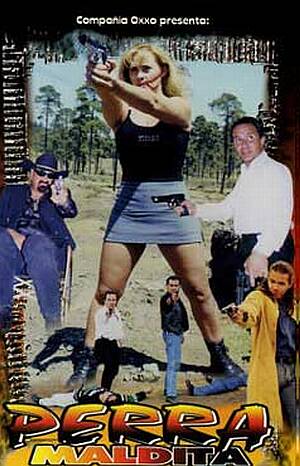 Camelia (Palmer) sees her way out of the ghetto in Ramiro (Saenz), a friend of her father’s who always has more than enough easy money. She convinces him to employ her as an apprentice, but discovers she likes sharing his life of drug-deals and casual slaughter. But they soon find out, they may not be the only ones capable of a good double-cross…
Camelia (Palmer) sees her way out of the ghetto in Ramiro (Saenz), a friend of her father’s who always has more than enough easy money. She convinces him to employ her as an apprentice, but discovers she likes sharing his life of drug-deals and casual slaughter. But they soon find out, they may not be the only ones capable of a good double-cross…
The translated title is appropriate, whether she’s gunning down rivals or being used as a wager in a card game. Perhaps the most chilling thing is her taciturn acquiescence when she’s lost in the latter, which demonstrates how far her (originally virgin) character has come. Palmer certainly has a forceful presence that helps overcome obvious limitations on the action front; despite copious training montages, Camelia is much less effective and impressive with her fists than a gun. Then, her cold-blooded passion – I know that seems a contradiction in terms, but it’s the best way to describe it – can truly flower.
The script and acting are solid, with occasional moments of effectiveness where the film punches above its weight, such as her mentor explaining why you must always be ready for a quick escape. More of this kind of depth would have been welcome, as would, I confess, subtitles: even Chris had a hard time with the gutter slang frequently used here, and without a translator, you’ll miss details like Camelia’s family heritage, which is steeped in blood too. These factors likely prevent this from getting the seal of approval; but on the whole, the performances are surprisingly credible, and this is the best girls-with-guns example of Mexploitation we’ve seen to date.
Dir: Tono Chavez
Star: Valeria Palmer, Fernando Saenz, Eleazar Garcia Jr.





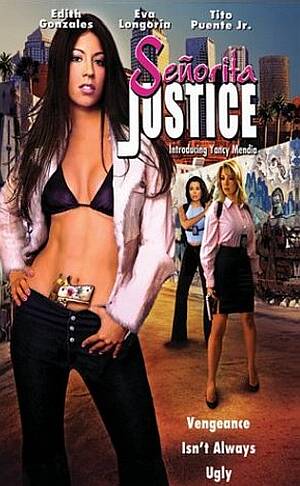 This is an interesting contrast to Sunland Heat which took a woeful script and executed it briskly enough to work. Here, the story isn’t bad – Anna Rios, a Hispanic lawyer (with a special forces background!) goes back to her roots, after her brother is gunned-down, and uncovers a maze of murky deals. It’s the execution which is largely inept, “Kantz” providing further evidence that one-name directors suck at GWG films – see also Charlie’s Angels: Full Throttle (McQ), Catwoman (Pitof), Ecks vs. Sever (Kaos) and Tomb Raider 2 (Jandebont).
This is an interesting contrast to Sunland Heat which took a woeful script and executed it briskly enough to work. Here, the story isn’t bad – Anna Rios, a Hispanic lawyer (with a special forces background!) goes back to her roots, after her brother is gunned-down, and uncovers a maze of murky deals. It’s the execution which is largely inept, “Kantz” providing further evidence that one-name directors suck at GWG films – see also Charlie’s Angels: Full Throttle (McQ), Catwoman (Pitof), Ecks vs. Sever (Kaos) and Tomb Raider 2 (Jandebont).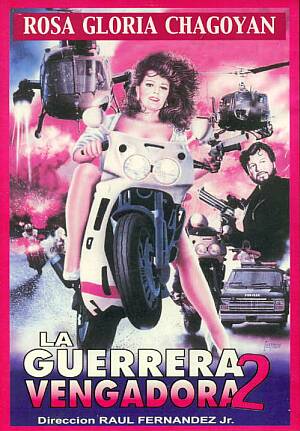 Chagoyan is perhaps the nearest thing Mexico has to offer to an action heroine. She best known for her role in Lola la Trailera (‘Lola the Trucker’), in which, she played the daughter of a haulier – she takes over his business and goes out for vengeance, after he’s gunned down for refusing to assist a drug-cartel. Almost a decade later, that director’s son would helm this, in which Chagoyan plays a teacher who moonlights as a crime-fighting vigilante. Not having seen part one isn’t much of a problem; presumably it explains her origins, and perhaps how she gets to spend so much time away from her job. All we see here is one class, before she and her midget sidekick take on a gang who kill one of her pupils (with a surprising amount of blood, it has to be said). Then, when she’s blamed for kidnapping the daughter of the police chief, she has to find the real culprits and clear her name.
Chagoyan is perhaps the nearest thing Mexico has to offer to an action heroine. She best known for her role in Lola la Trailera (‘Lola the Trucker’), in which, she played the daughter of a haulier – she takes over his business and goes out for vengeance, after he’s gunned down for refusing to assist a drug-cartel. Almost a decade later, that director’s son would helm this, in which Chagoyan plays a teacher who moonlights as a crime-fighting vigilante. Not having seen part one isn’t much of a problem; presumably it explains her origins, and perhaps how she gets to spend so much time away from her job. All we see here is one class, before she and her midget sidekick take on a gang who kill one of her pupils (with a surprising amount of blood, it has to be said). Then, when she’s blamed for kidnapping the daughter of the police chief, she has to find the real culprits and clear her name. This Brazillian-shot entry has a lot of good ideas, and some excellent moments, but comes up short with a script that borders on the incomprehensible. For example, in the middle of the film, the hero and heroine are both shot with tranquilizer darts – but no subsequent mention or explanation of this ever appears. This kind of sloppy plotting plagues the movie; it’s almost half-way through before the basic story becomes clear.
This Brazillian-shot entry has a lot of good ideas, and some excellent moments, but comes up short with a script that borders on the incomprehensible. For example, in the middle of the film, the hero and heroine are both shot with tranquilizer darts – but no subsequent mention or explanation of this ever appears. This kind of sloppy plotting plagues the movie; it’s almost half-way through before the basic story becomes clear.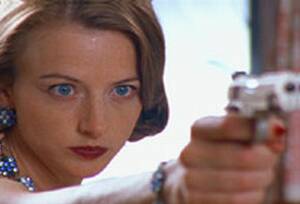 There’s lots to appreciate, not least the actors. As opposed to many films, Hagen here actually looks like she could kick your ass, and the flashback fight sequence is excellent – I’d like to have seen more of that, and all the battles are well staged and shot. While Perry is somewhat bland, he’s effective in action; Richardson is a B-movie veteran for almost two decades (Hollywood Chainsaw Hookers, Attack of the 60-foot Centrefold, etc.), and has a nice, world-weary air here. But Putney (left) is perhaps the best find as Daniel’s gun-toting sidekick, Jackie; the final scene between her and her boss is fabulously intense. And there are other cool little aspects, in things like Daniel’s henchmen.
There’s lots to appreciate, not least the actors. As opposed to many films, Hagen here actually looks like she could kick your ass, and the flashback fight sequence is excellent – I’d like to have seen more of that, and all the battles are well staged and shot. While Perry is somewhat bland, he’s effective in action; Richardson is a B-movie veteran for almost two decades (Hollywood Chainsaw Hookers, Attack of the 60-foot Centrefold, etc.), and has a nice, world-weary air here. But Putney (left) is perhaps the best find as Daniel’s gun-toting sidekick, Jackie; the final scene between her and her boss is fabulously intense. And there are other cool little aspects, in things like Daniel’s henchmen.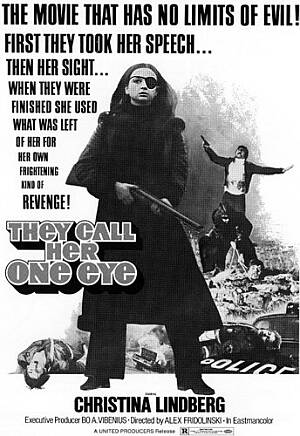
 Right from the first scene, depicting the molestation of a young girl, this is remarkably unrelenting stuff. 15 years later, the heroine (Lindberg), turned mute by her ordeal is kidnapped, turned into a junkie and forced in prostitution. Oh, and had an eye destroyed by her pimp (Hopf) – in loving, close-up, slow-motion that is rumoured to have involved a real corpse – after clawing the face of her first client.
Right from the first scene, depicting the molestation of a young girl, this is remarkably unrelenting stuff. 15 years later, the heroine (Lindberg), turned mute by her ordeal is kidnapped, turned into a junkie and forced in prostitution. Oh, and had an eye destroyed by her pimp (Hopf) – in loving, close-up, slow-motion that is rumoured to have involved a real corpse – after clawing the face of her first client. You’ve got to admire any film – particularly a TV movie – that provokes diverse reviews. This, then, not only “
You’ve got to admire any film – particularly a TV movie – that provokes diverse reviews. This, then, not only “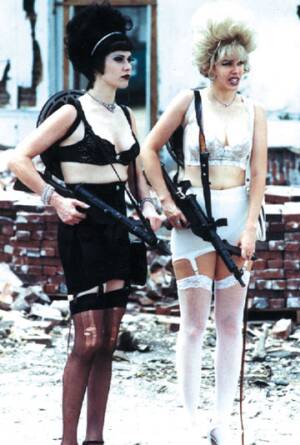 After civilization’s collapse, men have regressed to the level of Neanderthals, while women live in clans decided by their hair colour, with names like the FayWrays, Satanas and Tempests. Clothing is in short supply: lingerie, it would appear, is not, and nor are large, automatic weapons. Unsurprisingly, this leads perhaps to the finest opening five minutes in girls/guns cinema ever – “My name is Rachel, and I am a blonde. Blondes are extinct” – as our heavily-armed, suspender-and-stiletto clad heroines stagger round a post-apocalyptic landscape. This looks fabulous, and totally belies the fact that it cost $16,000 and was made in sixteen days.
After civilization’s collapse, men have regressed to the level of Neanderthals, while women live in clans decided by their hair colour, with names like the FayWrays, Satanas and Tempests. Clothing is in short supply: lingerie, it would appear, is not, and nor are large, automatic weapons. Unsurprisingly, this leads perhaps to the finest opening five minutes in girls/guns cinema ever – “My name is Rachel, and I am a blonde. Blondes are extinct” – as our heavily-armed, suspender-and-stiletto clad heroines stagger round a post-apocalyptic landscape. This looks fabulous, and totally belies the fact that it cost $16,000 and was made in sixteen days.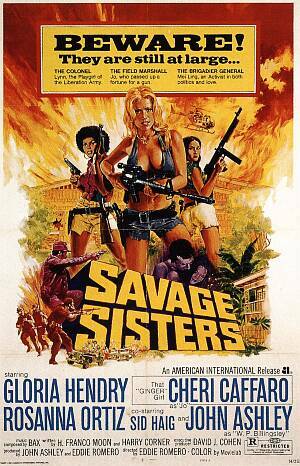 This Philippino phlick doesn’t quite have the courage of its convictions, and is never quite sure whether it wants to be sexploitation or serious drama. The poster promises a lot more than the film actually delivers, which is a shame, as the performances from the three leading ladies are nicely judged – as well as refreshingly multicultural. Two of them (Caffaro and Ortiz, one Caucasian, the other “Oriental”) are sent to prison, but when their torturer (ex-Bond girl Hendry, who initially comes over almost like a Black Ilsa) discovers they may know the whereabouts of a million bucks in cash, she helps spring them, and the trio head off, along with a local hustler (Ashley).
This Philippino phlick doesn’t quite have the courage of its convictions, and is never quite sure whether it wants to be sexploitation or serious drama. The poster promises a lot more than the film actually delivers, which is a shame, as the performances from the three leading ladies are nicely judged – as well as refreshingly multicultural. Two of them (Caffaro and Ortiz, one Caucasian, the other “Oriental”) are sent to prison, but when their torturer (ex-Bond girl Hendry, who initially comes over almost like a Black Ilsa) discovers they may know the whereabouts of a million bucks in cash, she helps spring them, and the trio head off, along with a local hustler (Ashley).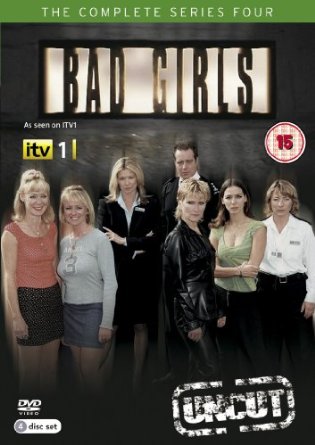
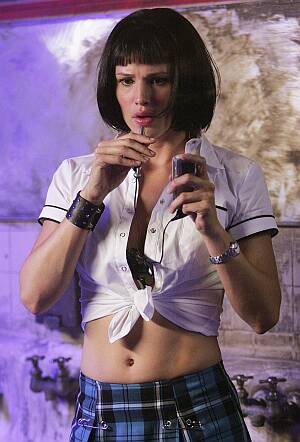 Poor Alias. Shunted from its Sunday slot to make way for Desperate Housewives – which proved successful beyond SD-6’s wildest dreams – this season felt as if JJ Abrams was more devoted to his second child, Lost (again, the owner of bigger ratings). By the end of the season it was Sydney, Jack, and their associates who found themselves both lost and somewhat desperate in TV-land, despite much-improved viewing figures – largely a result of following Lost, which got about 30% more audience.
Poor Alias. Shunted from its Sunday slot to make way for Desperate Housewives – which proved successful beyond SD-6’s wildest dreams – this season felt as if JJ Abrams was more devoted to his second child, Lost (again, the owner of bigger ratings). By the end of the season it was Sydney, Jack, and their associates who found themselves both lost and somewhat desperate in TV-land, despite much-improved viewing figures – largely a result of following Lost, which got about 30% more audience.